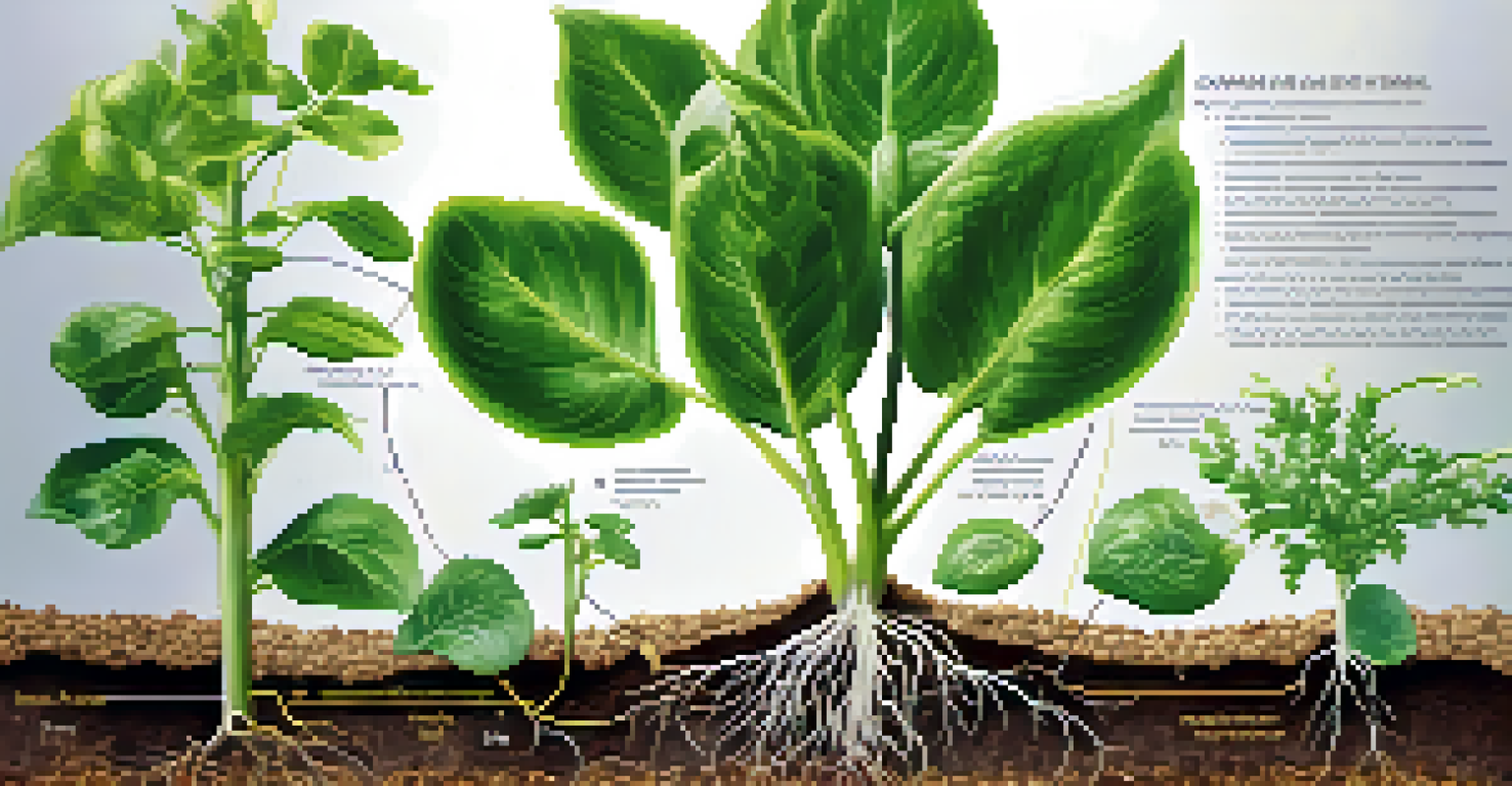Zinc and Its Importance for Enzymatic Plant Functions

Understanding Zinc's Role in Plant Growth
Zinc is a trace element vital for the healthy growth of plants. While it’s needed in small amounts, its impact on various physiological processes is significant. Plants require zinc primarily for enzyme function, which helps in the synthesis of proteins and DNA. Without adequate zinc, plants can exhibit stunted growth and poor development.
Zinc is essential for plant growth and development, influencing enzymatic functions and disease resistance.
Enzymes are like little workers in a plant, helping to speed up chemical reactions. Zinc acts as a cofactor for over 300 enzymes, facilitating crucial processes such as photosynthesis and respiration. This means that without zinc, these processes can slow down, leading to reduced energy production for the plant.
Additionally, zinc plays a role in hormone regulation, particularly in the production of auxins—hormones that influence growth and development. Thus, ensuring plants receive enough zinc is essential for maintaining their health and vigor.
The Link Between Zinc and Enzymatic Activity
Enzymatic activity is crucial for plant metabolism, and zinc is directly involved in this process. It helps activate enzymes that are responsible for breaking down nutrients, making them more accessible for the plant. This is particularly important during the early stages of plant growth when nutrient uptake is critical.

For example, the enzyme carbonic anhydrase, which is dependent on zinc, plays a significant role in photosynthesis by facilitating the conversion of carbon dioxide into organic compounds. Without sufficient zinc, this enzyme’s activity can diminish, leading to less efficient energy capture.
Zinc is Vital for Plant Growth
Zinc plays a crucial role in enzyme function, protein synthesis, and overall plant health.
Moreover, zinc influences the activity of antioxidant enzymes, which help protect plants from oxidative stress. This protection is vital for maintaining healthy foliage and overall plant resilience against environmental stressors.
Symptoms of Zinc Deficiency in Plants
Recognizing zinc deficiency in plants can be a game-changer for gardeners and farmers. Common symptoms include interveinal chlorosis, where the leaves turn yellow while the leaf veins remain green. This condition reflects the plant’s struggle to produce chlorophyll, which is necessary for photosynthesis.
The health of our soils is the foundation for healthy plants, and zinc plays a crucial role in that balance.
Another indicator is stunted growth or a rosette appearance, where the plant appears bushy but lacks height. This happens because the plant is unable to properly regulate its growth hormones due to insufficient zinc. Additionally, young leaves may become small and distorted, making it clear that the plant is lacking this essential nutrient.
If left untreated, zinc deficiency can lead to poor fruit and seed development, ultimately affecting yield. Therefore, identifying and addressing these symptoms early can help ensure healthier plants and better harvests.
Sources of Zinc for Plants
Providing plants with adequate zinc can be achieved through various sources. Zinc is naturally found in soil, but its availability can be affected by pH levels and soil composition. Alkaline soils, for example, can bind zinc, making it harder for plants to absorb.
Soil amendments like zinc sulfate or chelated zinc can be added to boost zinc levels in deficient soils. These amendments dissolve easily, allowing plants to take up zinc more effectively. Additionally, organic matter, such as compost, can improve soil health and enhance zinc availability.
Zinc Deficiency Affects Yields
Symptoms like chlorosis and stunted growth indicate zinc deficiency, which can lead to poor fruit and seed development.
Foliar sprays containing zinc can also be an effective method for treating deficiency quickly. This application allows for rapid absorption through the leaves, providing an immediate boost to the plant’s health and enzymatic functions.
Zinc's Role in Enhancing Plant Resistance
Zinc not only improves enzymatic functions but also enhances a plant's resistance to diseases. Healthy plants with adequate zinc levels are better equipped to fend off pathogens and pests. This resilience is crucial in maintaining crop health and productivity.
Research indicates that zinc strengthens the plant’s cell walls and activates defense mechanisms. When plants are fortified with zinc, they can produce more phytochemicals, which act as natural deterrents to harmful insects and diseases. This means that zinc can play a proactive role in pest management.
Furthermore, zinc's role in regulating stress responses, such as drought or salinity, adds another layer of protection. By ensuring that plants can cope with adverse conditions, zinc helps maintain their overall health, resulting in better yields.
The Importance of Zinc in Sustainable Agriculture
In the context of sustainable agriculture, zinc is a key player in promoting efficient nutrient use. As farmers aim to reduce chemical inputs, ensuring adequate zinc availability can lead to healthier crops without the need for excessive fertilizers. This approach supports both environmental health and crop productivity.
Integrating zinc management into crop rotation and soil health practices can enhance overall soil fertility. By focusing on zinc and other micronutrients, farmers can create a balanced nutrient profile that supports long-term agricultural sustainability.
Zinc Enhances Disease Resistance
Adequate zinc levels improve plants' ability to fend off pathogens and cope with environmental stress.
Moreover, educating farmers about the importance of zinc can lead to better management practices, ensuring that they monitor soil health and plant nutrition regularly. This proactive approach can ultimately result in more resilient farming systems.
Conclusion: The Essential Nature of Zinc in Plants
In conclusion, zinc is not just a minor player in plant health; it is an essential nutrient that supports numerous enzymatic functions vital for growth and development. From aiding in photosynthesis to enhancing disease resistance, its role cannot be overstated.
Ensuring that plants have access to adequate zinc can lead to healthier crops, better yields, and more sustainable farming practices. By understanding the importance of this trace element, gardeners and farmers can make informed decisions to boost plant health.

Ultimately, prioritizing zinc in plant nutrition is a simple yet effective strategy for cultivating thriving gardens and bountiful harvests.